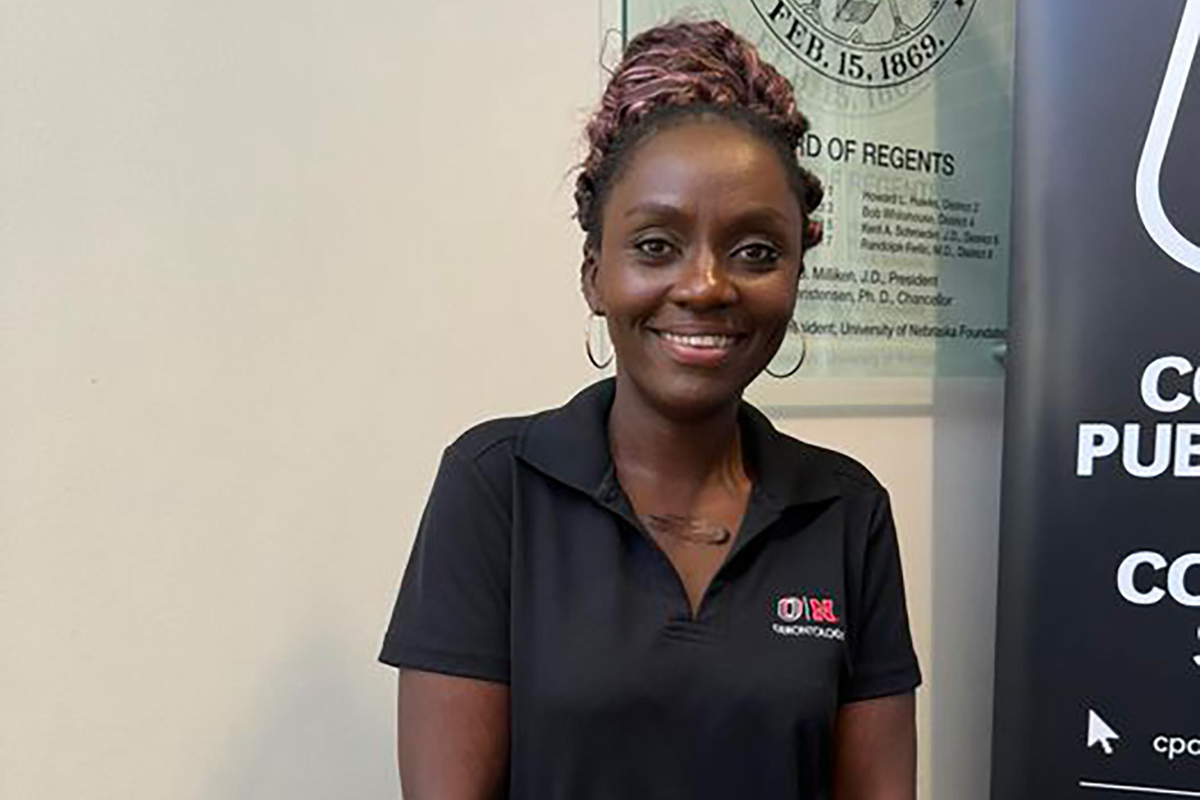Naomi Adjei: Exploring Caregiver Burden in Dementia Through the Aging Brain and Emotion Lab
- published: 2024/11/05
- contact: Debbie Vihstadt - College of Public Affairs and Community Service
- phone: 402.554.3033
- email: dvihstadt@unomaha.edu

Naomi Adjei, a doctoral student in gerontology at the University of Nebraska at Omaha, is dedicating her research to better understand the challenges faced by caregivers of people with dementia. As a research assistant in the Aging Brain and Emotion Lab, Adjei collaborates with her mentor, Dr. Janelle Beadle, to investigate how caregiving impacts those supporting people with neurodegenerative disorders such as Alzheimer’s disease and frontotemporal dementia.
The ABE Lab Experience
Describing her experience in the ABE Lab, Adjei said, “It’s such a unique environment because we’re a very close group. There are three of us who have been there together for years, and we talk about all things health and healthy aging.” She added, “Besides research, we love applying what we’re learning through the data.”
The lab serves as more than just a research space; it’s a collaborative environment where ideas are exchanged and research findings are discussed in terms of their practical implications. “We have a blast,” Adjei said. “It’s not just about data; it’s about how we can actually use this knowledge to help others.”
Focusing on Caregiver Burden
Adjei’s primary research investigates caregiver burden, a concept that encompasses the emotional, financial, social, and physical strain experienced by caregivers. Her study examines the differences in burden experienced by caregivers who support people with Alzheimer’s disease versus those with frontotemporal dementia. Given that each type of dementia presents different behavioral and psychological symptoms, Adjei’s work is essential in uncovering how these differences affect caregivers’ well-being.
Explaining the purpose of her research, Adjei said, “We’re looking at how aging impacts social recognition, our cognitive abilities, and emotional abilities. It’s a big project, and the goal is to understand how we can better support caregivers who are often left to navigate these challenges on their own.”
Research Methodology and Impact
Adjei’s passion for caregiving, especially for those supporting people with dementia, stems from her own experiences. “In my last job, I was a care director in a church,” she shared. “I worked with a family where the husband was diagnosed with Alzheimer’s. His wife had to quit her job to become his caregiver, and it was very complex. I realized that I wasn’t equipped to handle that situation and wanted to understand more about Alzheimer’s and how we can support caregivers.”
To gain insights into these caregiving experiences, Adjei’s research involves working with unpaid family caregivers age 50 and older who have been in their caregiving role for at least six months. This study identifies the factors that contribute most to caregiver burden and investigates whether positive aspects of caregiving can mediate the relationship between caregiving responsibilities and burden. One key tool used is the Zarit Burden Inventory, a reliable measure of caregiver burden.
I want to create systems and practical tools that can help caregivers navigate their journey,” she said. “It’s not just about creating policies but finding real, tangible solutions that people can use every day.”
Speaking about the impact of her research, Adjei said, “I think it’s very important work because everybody’s aging. A lot of people have to quit their jobs to take care of their loved ones, and they don’t get much support. I hope that my work can create better systems where people can be educated about caregiving and policies can be established to offer more support.”
The Path Ahead
Adjei’s dedication to her research is driven by her desire to provide caregivers with tools and support to manage their challenging roles. “I want to create systems and practical tools that can help caregivers navigate their journey,” she said. “It’s not just about creating policies but finding real, tangible solutions that people can use every day.”
She emphasized the importance of changing societal perceptions about aging: “I think my passion is presenting the right perspective of aging, but also providing the right tools, support, and health systems to help caregivers. We have to change our language and how we talk about aging, as well as how we provide care.”
Adjei hopes her work will lead to practical solutions that support caregivers and inform policies that recognize and address the complexities of caregiving for people with dementia. Her commitment to gerontology and her passion for addressing the emotional and psychological challenges of caregiving make her an invaluable contributor to the ABE Lab and the wider research community.
Current Study Recruitment
The Aging Brain and Emotion Lab is currently recruiting participants for two studies:
- The Impact of Aging on the Neural and Behavioral Bases of Social Processing
- Characterizing Risk Factors for Burden in Caregivers to Individuals with Alzheimer’s Disease and Frontotemporal Dementia
Those interested in participating can contact the lab at:
The Aging Brain and Emotion Lab
Office phone: 402-554-5961
Email: abelabuno@gmail.com